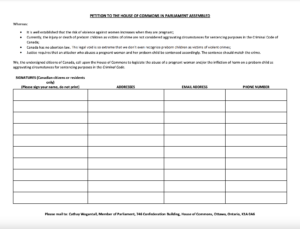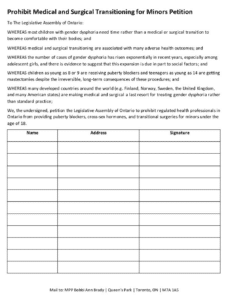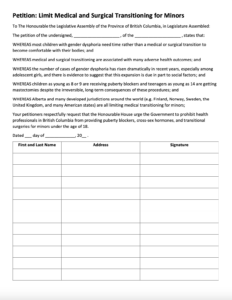Petition to the (Reformed) Christians across Canada
Whereas…
- Petitions are part of our democratic process.
Petitions are one way that citizens can formally ask the government to change a policy, law, or spending. The Speaker of the House in 1947, Gaspard Fauteux, recognized that, “All authorities agree that the right of petitioning parliament for redress of grievances is acknowledged as a fundamental principle of the constitution. It has been uninterruptedly exercised from very early times and has had a profound effect in determining the main forms of parliamentary procedure.” - Petitions are hundreds of years old.
Petitions have been around for hundreds of years in our Parliamentary style of government. They began as petitions from regular citizens to the 13th-century English king Edward I and then judges as a way to seek justice for a grievance committed against them. As the English Parliament assumed a greater and greater share of the governance of England, petitions gradually became addressed to Parliament. In 1689, the English Bill of Rights declared that “it is the right of the subject to petition the King, and all commitments and prosecutions for such petitions are illegal.” - Petitions are prayers.
At the heart of every petition is a request asking Parliament to change a law or policy or its spending. For centuries, this request was called a “prayer,” reflecting the religious heritage of the United Kingdom and of Canada and demonstrating proper respect for the governing authorities. Petitions are never demands made of people to the government. They are humble prayers of the people to the authorities that God has place over them. That’s why ARPA’s policy reports always sign off, “respectfully submitted.” - Petitions are easy.
The Parliament of Canada accepts both paper petitions and e-petitions, though different rules govern the format and the use of these petitions. Normally, in our representative democracy, citizens are supposed to communicate to the government through their local MP. With petitions, however, you will often communicate with a particular MP who is passionate about a specific topic and is willing to present petitions from citizens across the country. All you need to do is sign your name. - Petitions get heard.
On every day of routine proceedings, there is 15 minutes set aside for the presentation of official petitions. This time gives that Member of Parliament the opportunity to stand up in the House of Commons and raise the petition of citizens to the government. Even if the government of the day doesn’t want to talk about a given topic, presenting petitions is an opportunity for citizens to have their concerns voiced directedly in the halls of Parliament. Please note that not all petitions people ask you to sign are official House of Commons petitions that actually are able to be used. While it is cool to see how many people sign onto petitions on sites like CitizenGo or Change.org and to form communities with shared interests, these petitions cannot be presented in the House of Commons. - Petitions get responses.
The government is legally obligated to respond to petitions. Within 45 days of an MP presenting a petition, the government must give an official response to the petition. Usually, these responses come from a Minister or their Parliamentary Secretary (who is also an MP).
We, the undersigned, staff members of the Association for Reformed Political Action (ARPA) Canada, call upon (Reformed) Christians across the country to:
- Sign a petition;
- Sign another petition; and
- Keep on signing petitions.
Current Online Petitions
No online petitions available right now.
Current Print Petitions
Pre-born Victims of Crime – Government of Canada


